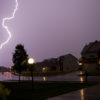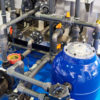Pool Pump Not Working? Troubleshooting Tips & Common Problems
Pool pumps are essential components of your pool’s circulation system, responsible for keeping the water clean and well-circulated. However, like any mechanical device, pool pumps are susceptible to wear and tear over time. Troubleshooting problems early can save homeowners a lot of money on costly repairs or replacements in the future.
Here, we’ll go over how knowing the common signs that your swimming pool pump may be malfunctioning and addressing them promptly is crucial for extending its lifespan and maintaining efficient pool operation.
Why did my pump/motor go out?
The average lifespan of an electric pump motor can depend on many variables, so it can be difficult to determine one single reason for pump failure.
Common Signs Your Pool Pump Needs Troubleshooting
There are several signs that can indicate that your pump may need attention besides when the pool pump stopped working altogether or before the pool pump is broken. These include:
- Pool Pump Not Working: If your pool pump completely fails to start, it could be due to a variety of reasons, including electrical issues, a faulty capacitor or a damaged motor. This may also happen if the pump is not primed properly.
- Pool Pump Working But Water Not Circulating: A pump that’s running but failing to circulate water properly can be caused by a clogged impeller, dirty filter or air in the system. This can prevent the proper flow of water through the pool and filtration system, leading to inefficiency.
- Noisy Operation: If your pool pump is making a loud noise or strange sounds – such as grinding, screeching or rattling – this could indicate a problem with the motor, bearings or impeller. These noises often signal that the pump is under stress and may be at risk of failure.
- Pool Pump Not Suctioning: If the pool pump isn’t suctioning effectively, the issue could be related to a clogged pool filter, air in the pump or a faulty valve. When the suction is weak or nonexistent, the water flow through the pool decreases, which can impact filtration and water quality.
- Leaks Around the Pump: Water pooling around the pump or system could point to leaks in the pump seals or plumbing connections. These leaks can lead to inefficiency and potential damage to the motor or other components.
- Increased Energy Bills: If your pool pump is working harder than necessary due to clogged filters, air in the system or incorrect settings, it will consume more energy. You may notice an increase in your energy bills as a result of these issues.
How Early Issue Identification Saves Money
The earlier you can identify problems with your pool pump, the more you can prevent small issues from escalating into major failures that require expensive repairs or replacements. Regular pool maintenance – such as cleaning filters and checking for leaks – can help prevent common pump issues from worsening. Plus, early identification of problems allows you to schedule repairs before a breakdown occurs, helping you avoid the emergency service fees that can come with pump failures.
Importance of Regular Pool Pump Maintenance for Efficiency and Longevity
Regular maintenance is key to prolonging the life of your pool pump and keeping it running smoothly. Simple tasks such as cleaning the pump basket, checking the pump motor for debris and inspecting hoses and seals can go a long way in preventing major issues. Regularly cleaning and replacing filters will keep the pump from overworking, reducing wear and tear on the motor. Additionally, a well-maintained pool pump runs more efficiently, keeping energy costs down.
Properly maintaining the pool pump also helps ensure that it operates at its best, keeping your pool water clean and clear. An efficiently running pump means less stress on the system, fewer breakdowns and a lower chance of needing costly repairs or replacements. Maintaining your pool pump isn’t just about saving money – it’s also about keeping your pool water safe and enjoyable for all users.
Common Pool Pump Problems
Here are some of the most common pool pump problems, along with explanations on how to fix your pool pump for each:
Clogged Pump Impeller
Over time, debris like leaves, twigs and dirt can clog the pump impeller, restricting water flow. This causes the pump to work harder, reducing efficiency and increasing energy costs.
Low Pump Pressure
Low pump pressure can be caused by clogged filters, air trapped in the system or a malfunctioning impeller. This issue reduces filtration efficiency, leaving the pool water cloudy and dirty.
Pump Motor Overheating
If the pool pump motor is overheating, it could be due to improper ventilation or overworking due to dirty filters or an incorrect pool heat pump setting. Overheating can cause permanent damage to the motor if left unchecked.
Leaking Pump Seal
A leaking pump seal can lead to water pooling around the pump, causing motor damage. This issue is often caused by worn-out seals that need replacing.
Pump Not Turning On
A pump that refuses to turn on may have electrical issues, a faulty capacitor or a broken motor. Troubleshooting this problem typically involves inspecting electrical connections and testing the motor components.
Air in the Pump
Air bubbles in the system are often caused by a loose pump lid, faulty O-rings or cracks in the suction line. Air can prevent the pump from properly priming, causing reduced suction and potentially drying out the motor.
Pump Cycling On and Off
If your pump is cycling on and off frequently, the issue could lie in the electrical system or a malfunctioning timer. A professional inspection is needed to prevent further damage.
Improperly Sized Pump
Using a pump that is either too large or too small for your pool’s needs can result in inefficiency, excessive wear and higher energy bills. It’s important to ensure the pump size matches the pool’s specifications for optimal performance.
These are some of the most common reasons why a motor may fail earlier than average.
Bad Environment
The single most common reason for pump failure in any climate is bad environment. Many homeowners do not realize how long their pool equipment is in the sun, or they may not be aware of a sprinkler nearby or run-off from the roof during heavy rain. But for the most part, the shadier and drier the environment, the slower the motor will rust and corrode and eventually fail. Rust, corrosion or warping of the outer shell of the motor is tell-tale sign of this. It also may come from underneath, if too much ground or debris is allowed to build up around or underneath your pool equipment. Always keep the bushes and other growth away from your equipment pad by trimming them back on a regular basis.
Distance from Equipment to Pool
The farther the water has to go, the more work the pump will do.
Height of Pool
Height of pool, in relation to pool equipment, or other factors that increase back pressure or resistance to flow. Sometimes, pools or their equipment are placed above ground level, while the other is not. This will always create more work for the pool pump as well.
Solar Panels
Pumping the water to the roof, against gravity, always leads to a shorter lifespan. This is why we encourage people to keep their solar off, when it is not needed. It is also important to have the appropriate horsepower when there is solar heat vs. not having solar heat.
Bad Filtration or Plumbing
This is why it is important to regularly change filters and backwash, especially in the case where you have a cartridge filter. While plumbing the pool and its equipment is often up to the builder, how efficiently this is done can make a huge difference to the homeowners pocket several years down the road. Also, just because your cartridge looks clean, does not mean that it is good for your pump. Always know your filter’s “starting pressure.” This is the reading you get on the pressure gauge with no cartridge in the filter. If your clean filter is causing that pressure to increase by more than 5 psi, you should probably get a new one. Never use the same filter cartridge for more than 2-3 years.
Get Professional Help to Keep Your Pool Pump Running Smoothly
Proper maintenance and troubleshooting pool pump problems early can save you from costly repairs and replacements. If you’re experiencing any of these issues, don’t wait until they escalate into major problems. Regularly inspecting your system and identifying small issues can help maintain efficiency and prolong the life of your pump.
For expert troubleshooting and maintenance, Pool Troopers is here with the pool pump services you need. Contact us today and let our experienced team help you keep your pool system running smoothly and efficiently all season long.



